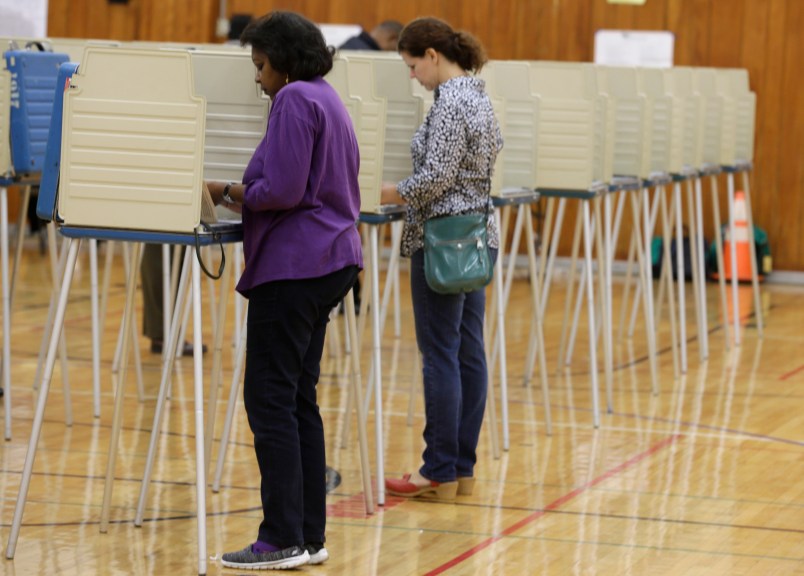A federal court Tuesday struck down a provision of Ohio law that scaled back the early voting period in the state.
Judge Michael Watson, of the U.S District Court of the Southerm District of Ohio, ruled that the provision was a violation of the 14th Amendment and the Voting Rights Act.
The ruling comes in a lawsuit filed by voting rights attorney Marc Elias — who is also the general counsel of the Hillary Clinton campaign — on behalf of The Ohio Organizing Collaborative and individual voters in the state. It targeted a number of changes to Ohio voting laws, including the elimination of “Golden Week,” a period when residents could register to vote and vote on the same day.
Watson, a George W. Bush-appointee, said the move to reduce early voting so that it begins the day after voting registration closed was unconstitutional as well as a violation of the Voting Rights Act, and said the state was not allowed the enforce it.
In his opinion, he said the elimination of Golden Week was a “modest burden” on African Americans’ ability to vote because it reduced the days of in-person voting as well as the opportunity for same-day registration. He said, based on expert testimony and anecdotal evidence, that African-Americans bore a disproportionate burden, because they tend to vote in person during Golden Week at a “significantly higher rate than other voters.”
“Moreover, to the extent that voters who would have voted during Golden Week choose to vote on other early voting days or on Election Day, that will likely result in longer lines at the polls, thereby increasing the burdens for those who must wait in those lines and deterring early voting,” Watson said. He said that African Americans disproportionately bear these burdens because they have “greater time and resource limitations.”
He said that, likewise, African Americans stood to be disproportionately affected by the elimination of same day voting, because they are “more likely to be subject to economic, transportation, time, and childcare costs that increase the cost of voting.”
Watson questioned the state’s justification of the burden the law imposed: to prevent voting fraud. He noted that voting fraud is very rare, particularly when it comes to in-person voting. The judge said the other reasons the state put forward in defending the law, including reducing administrative costs, did not outweigh its burden.
The lawsuit targeted other changes to Ohio’s voting laws, including measures that put a limit of one in-person voting center per county and a reduction in the number of voting machines a county is required to have. Tuesday’s ruling said the challengers had failed to prove these measures had a disproportionate burden on African Americans. The ruling did say a seperate provision being challenged — which placed new restrictions on when mail-in ballots could be sent out by counties unsolicited — did impose a “minimal” burden of African Americans, but that burden was “mitigated” by other factors. The judge also threw out a challenge to new information required on absentee ballots, AND other recently passed changes to mail-in ballot regulations.
Read the opinion below:







Still of limited benefit in SW Ohio since there are so few early voting sites and none of them are near public transport. But at least for those with wheels this should be a welcome relief.
Some good news.
To be fair, absentee voting in Ohio is really easy. You can apply for an absentee ballot online and they will mail it out to you. Then you can mail it back in. It doesn’t solve everything, but people who don’t have cars can vote early. I’ve often wondered why the Democratic Party doesn’t do more to push this part of earl voting.
Obviously this hurts Bernie Sanders.
Would be good if the Clinton camp could get some credit for this.